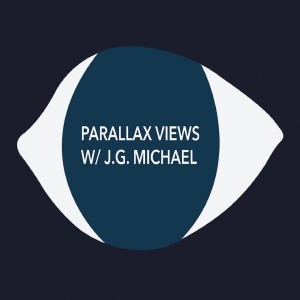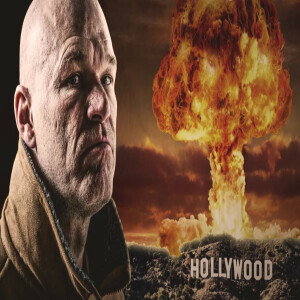
Parallax Views w/ J.G. Michael
Society & Culture

Sympathy for the Raging Boll: Re-Evaluating Filmmaker Uwe Boll, from the German QAnon Shooter Docudrama HANAU to the Columbine-Inspired HEART OF AMERICA w/ Uwe Boll
 2023-02-24
2023-02-24
On this edition of Parallax Views, controversial German-born filmmaker Uwe Boll has alternately been called "the world's worst director", potentially "the most misunderstood filmmaker in the business" and a "legitimate auteur", "a brutish bully inclined to lash out against his detractors", "the only filmmaker interested in investigating the likelihood of a violent response to political powerlessness" and "the only director taking the events the media treats as the country’s worst tragedies seriously", and an "asshole".
He's taken on his critics in a boxing match. He's worked with A-list Hollywood talents like Jason Statham, Michelle Rodriguez, Ben Kingsley, Christian Slater, Elizabeth Moss, Ray Liotta, J.K. Simmons, and Burt Reynolds. He's become known for his adaptation hit video game properties like House of the Dead, Bloodrayne, Alone in the Dark, Dungeon Siege, and Postal into movies that were slammed by gamers and critics. He's been a lightning rod for controversy due to some of his movies being financed by German tax shelters. He's also made more personal films dealing with or reflecting on social issues like Wall Street corruption and the financial crisis of 2009 (Assault on Wall Street), school shootings (Heart of America), spree murders and political violence (Rampage, Rampage: Capitol Punishment, and Rampage: President Down), prison brutality (Stoic), the Holocaust (Auschwitz), the genocide in Sudan's Darfur region (Attack on Darfur), and the absurdities of war (1968 Tunnel Rats).
Boll announced his retirement from directing in in 2016 with the release of Rampage: President Down, the last movie in his trilogy following the exploits of spree killer turned political terrorist Bill Williamson (played by Brendan Fletcher). During this retirement Boll kept helping produce films made by other directors, including the opioid epidemic documentary The Decline, as well as opening his own highly-lauded Vancouver-based restaurant Bauhaus. In 2022, however, Boll returned to the director's chair with Hanau (Deutschland im Winter - Part 1) or Hanau: Germany in Winter, a docudrama exploring the disturbed mind of Tobias R. and the descent into radicalization that led him to become the first recorded mass shooter inspired by the far-right wing conspiracy theory movement known as QAnon.
Now, Boll is continuing his return to cinema vis-a-vis his company Event Film. His next project is First Shift, a New York City crime/cop drama set to feature Sons of Anarchy's Kristen Renton and Shades of Blue's Gino Anthony. Also in the works for the filmmaker's comeback is a biopic of Elliot Ness of The Untouchables fame dealing with the Prohibition-era law enforcement agent's attempts to solve the Mad Butcher of Kingsbury Road or Cleveland Torso Murders case. In addition to all of this the cult film distributor Unearthed Films' is soon releasing the 2013 horror anthology The Profane Exhibit containing the Boll-directed segment "The Basement" about the depraved Austrian criminal Josef Fritzl that stars noted character actor Clint Howard and The Texas Chainsaw Massacre Part II's Caroline Williams.
Despite his busy schedule, Boll made time to chat with me for this edition of Parallax Views. I'll admit that I'm not completely objective in this conversation. I think Boll's gotten a raw deal in terms of how his films have been evaluated/perceived and I make that known in this extended discussion of his career. Rather than covering the video game adaptations he's notorious for or the infamous boxing match between Boll and his critics, this conversation focuses on Boll's early German film career, his transition to making films in Hollywood, his politics and explorations of social issues like men who "run amok", a great deal of discussion about his non-video game based movies, and more.
Among the topics covered throughout this episode:
- Uwe's early cinematic influences; Hollywood vs. the German New Wave cinema; Werner Herzog
- Uwe's German films: the irreverent comedy German Fried Movie and the arthouse spree shooter movie Amoklauf
- Uwe's dealing with the theme of people, particularly men, who "run amok" (going on rampages or killing sprees); fascination with what leads people to snap mentally
- Assault on Wall Street as a subversion of the Death Wish and similar revenge movies (ie: the vigilante goes after white collar criminal than pretty street thugs); the slow-burn nature of Assault on Wall Street; the 2008 financial crisis, Bernie Madoff, and what inspired Assault on Wall Street
- The overt, "in your face" politics of Assault on Wall Street and the Rampage movies
- Boll's school shooting drama Heart of America; the dark side of suburbia; Brendan Fletcher's portrayal of the school bully in Heart of America; Heart of America vs. Gus Van Sant's Elephant; the narrow view a teenaged mind can have about the future and how this relates to Heart of America; sometimes we change our way too late as a theme in Heart of America
- Boll's prison drama Stoic; Boll made the actors, including Terminator 2: Judgment Day's Edward Furlong, sleep in a prison cell in preparation for the film; relying on the improvisation of actors to create realism; Stoic and it's scary examination of how easy it is for people to dehumanize others
- Uwe's thoughts on Russia and the war in Ukraine
- Was there a specific moment that led to Uwe's political awakening?; NATO, Germany, and the Cold War; the East vs. West Germany divide; the Red Army Faction and the debated death of Ulrike Meinhof
- The Rampage trilogy and its main character, the teenager turned terrorist Bill Williamson; Williamson as a character who commits violent acts that disturb the viewer but also is, disturbingly, relatable in other ways (telling certain truths about the problems with society); the realism of the violence in Rampage as a deliberate contrast to Boll's early films trying to emulate unrealistic video game-style violence
- The evolution of the Bill Williamson character in the Rampage sequels; 2016's Rampage 3: President Down and the Jan 6th riots; Julian Assange and Wikileaks, Edward Snowden, the NSA, and the persecution of whistleblowers; Donald Trump's lack of pardons for the aforementioned whistleblowers
- Boll's Holocaust documentary Auschwitz; portraying the dehumanization of the camps and why the film included nudity (although not nudity that was meant to titillate but rather depict the stripping of human dignity that the Nazis perpetrated against Jews; the Israeli reception to Boll's exploration of Nazi death camps in Auschwitz; why Boll played an SS guard in the film
- Casting real life refugees in Attack on Darfur
- Films like Auschwitz and Attack on Darfur as attempts to force us to confront the reality of atrocities and genocides; why did no one intervene in Darfur?; war, profits, and exploitation; political violence, terrorism, and state violence
- Who was Tobias R., the German QAnon spree shooter? Why tell his story in the docudrama Hanau: Winter in Germany; Tobias R.'s mental disturbance, isolation, manifesto, and racist, xenophobic father; the rise of Trump and the radicalization of Tobias R.; the problem of misinformation, disinformation, and the destabilization game; are we getting screwed by all sides politically?; figures like Tobias R. are not alone (ie: QAnon is a social phenomena)
- The lack of common sense in the geopolitical power struggle in the world (some talk about the U.S., Russia, and China); the decline of diplomacy and the horrors of war; weapons manufacturers and war profiteering; climate change and the need to address the issues facing the environment
- The historical context of Boll's irreverent comedy Postal; the War on Terror, the George W. Bush administration, and 9/11
- The censorship of the first Rampage movie in Germany
- Boll's work as a producer; tax incentives and Boll's use of tax shelters (and the misperceptions people have about the use of those tax shelters); the money Boll made from DVD sales; movies like Stoic and Rampage would not have been made without the video game movies allowing Boll to make some cash to fund the later non-video game features
- Advice to young filmmakers; Boll's approach to directing actors; the state of cinema today; the importance of storytelling; the problem of self-censorship in cinema; it is cheaper to shoot a movie today in many ways than it was for when Boll first started filmmaking; how to foster a good relationship with actors; taking a straightforward approach with actors; Ron Perlman's assessment of Boll's approach to working with actors
- High-octane filmmaking, working on tights schedules, and practical struggles Boll and his crew face making films like House of the Dead and In the Name of the King: A Dungeon Siege Tale; taking into account the role of money in film production and being able to make one's money back; working with budgetary restraints as a filmmaker; filming Alone in the Dark and anecdote about Bryan Singer, Halle Berry, and the X-Men movies
- Boll's future projects; First Shift follows a day in the life of Brooklyn cops during a 12-hour shift; making a new movie about The Untouchables' Elliot Ness and the sad story of "Mad Butcher of Kingsbury Run"; a little info about the Boll-produced documentary The Decline about the North American opioid epidemic and fentanyl deaths (Boll saw the epidemic first hand while running his restaurant Bauhaus in Vancouver); Boll's documentary on the Bandidos Motorcycle Club gang
- And more!
More Episodes
Create your
podcast in
minutes
- Full-featured podcast site
- Unlimited storage and bandwidth
- Comprehensive podcast stats
- Distribute to Apple Podcasts, Spotify, and more
- Make money with your podcast
It is Free
- Privacy Policy
- Cookie Policy
- Terms of Use
- Consent Preferences
- Copyright © 2015-2024 Podbean.com





